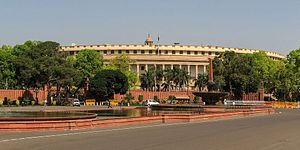Politics in India is at a low point. The opposition, led by the Congress party, has stalled both houses of parliament for over 12 days over the demonetization issue. The unruly and uncouth behavior of the parliamentarians has left a lot to be desired. Moreover, such frequent filibustering even while avoiding a healthy debate on the issue does not augur well for Indian democracy.
The opposition parties have threatened to disrupt both houses until the Indian prime minister, Narendra Modi, agrees to be present during the discussions. The government’s request to continue the discussions, and their assurance that Modi would respond to apprehensions in parliament, have fallen on deaf ears.
The frequent stalling of proceedings in the upper house, where the ruling Bharatiya Janata Party (BJP) does not have a majority, has already cost the exchequer over 100 million rupees ($15 million) so far. This comes at a time when many surveys carried out by international agencies have predicted that India is on the path to becoming a super power by 2020. The tactics adopted by the opposition have the potential to derail India’s growth story.
We also saw similar disruptions in the monsoon session of the parliament, when the upper house blocked the crucial Land Acquisition, Rehabilitation, and Resettlement bill, which would have given a fillip to foreign direct investment in setting up manufacturing hubs in India. It seems that the opposition parties’ one-point agenda is not to allow the Modi government to succeed. It is estimated that over Rs360 million ($54 million) has been lost due to India’s dysfunctional parliament.
The main objective behind the government’s surprise decision to demonetize Rs500 and Rs1,000 notes was to combat corruption, terrorism financing, and counterfeit currency coming from across India’s borders. The intent to demonetize was a bold and laudable move, but the poor implementation has put ordinary citizens to great inconvenience. It seems that the whole of India has been made to line up at banks; more than 90 people have lost their lives standing in long queues.
However, surprisingly most of the ordinary people, in spite of the inconvenience, back the prime minister’s decision, as they feel that the demonetization will help unearth billions of rupees stashed away by corrupt officials and businessmen to avoid paying tax.
On the other hand, many leading economists like Paul Krugman and Amartya Sen feel that the government may not achieve its objective by demonetizing the currency, despite causing hardship to citizens. Their fear stems from other countries that had demonetized their currencies, like Burma (1987); the former Soviet Union (1991), and North Korea (2009); all three failed miserably to unearth black money. Moreover, even if the move proves successful, the government, at best, would be able to unearth only 6 percent of black money, as 94 percent is believed to be invested in real estate and bullion rather than kept as cash.
According to an estimate by the World Bank, India’s black money is almost equivalent to one-fifth of India’s Gross Domestic Product. World Bank experts feel that the government should have also targeted the real estate sector in order to make the demonetization move worthwhile. Another cause of worry is that this move, and the ensuing chaos, could bring India’s GDP down by as much as 1 -2 percent.
If Modi’s bold move to unearth the black money proves successful, it will be not only a personal victory for him, but will bolster his image, both in India and abroad as a person who was successful in bringing violators of the law to heel. However, if the move fails, there is every danger that he may end up losing face among the ordinary people, who will feel let down after his bold promises to cleanse the system of corruption. This may also cast a shadow on his ability to win future elections with an overwhelming mandate, like in 2014 general elections, which had catapulted him from a regional satrap to a national leader.
To salvage the situation, the government should now take the opposition parties into its confidence so that the parliament is allowed to function. Modi’s government can rewin trust by effectively addressing issues caused by the demonetization, including recalibrating ATMs to handle the new banknotes and also ensuring that enough new notes are made available in all banks. By doing so, Modi can mitigate the sufferings of the ordinary people and boost relations with the opposition by addressing their concerns.
K.S.Venkatachalam is an independent columnist and political commentator. He writes a regular column for several leading newspapers.

































